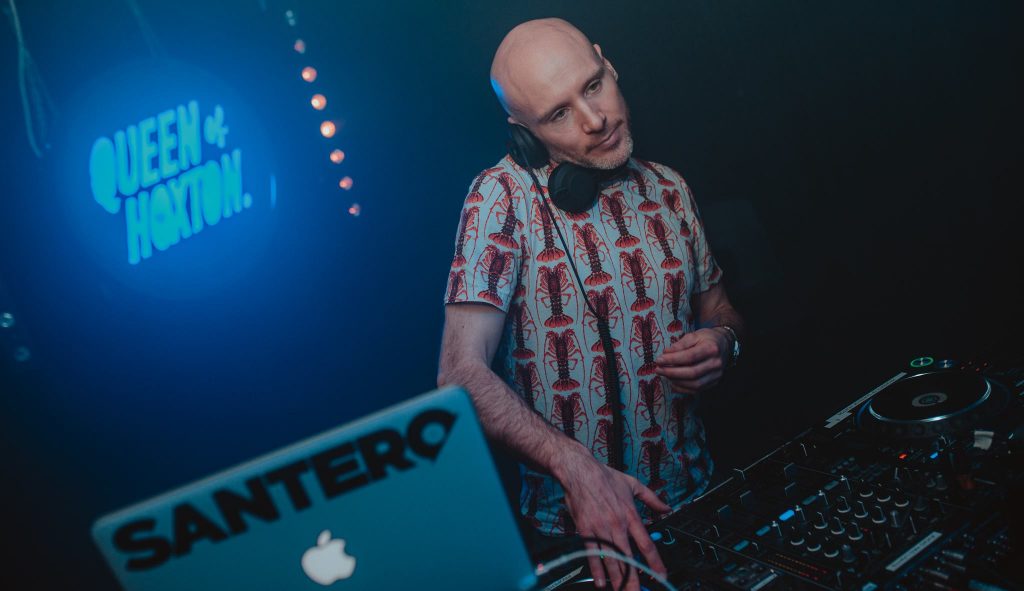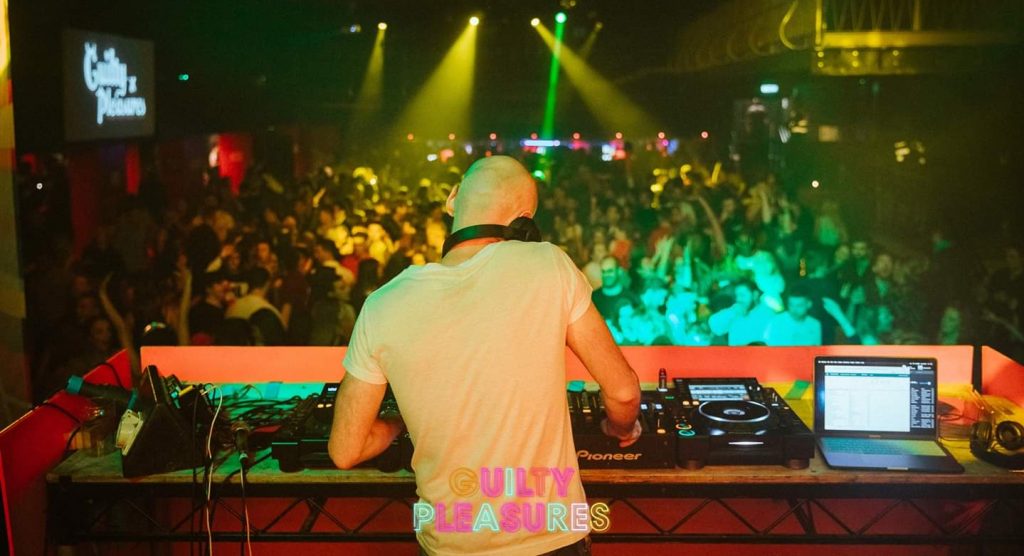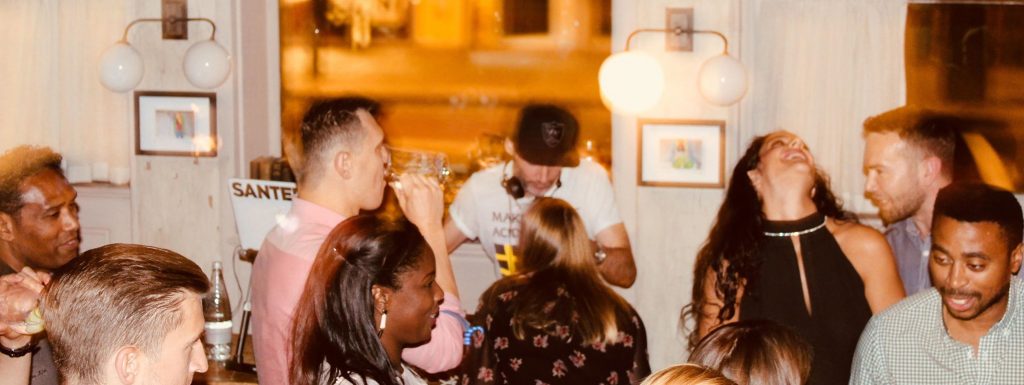
The Many Ways To Be A DJ – Residents
The first instalment of this series is going to look at one of the most common types of DJ, the local resident. Its not as glamorous as some parts of the DJ world, but it can actually be a very useful corner to establish yourself in!
It offers more job security than the average, less time spent schlepping from A to B for gigs, a chance to develop a relationship with a regular audience and go on to running your own nights, and much more besides. And in terms of developing your skills as a DJ, few things can beat regular gigs – a huge amount of famous DJs started out with regular low-key residencies, where they honed their craft before breaking out into stardom!
I have a lot of experience of this sort of DJing, having started my career nearly 20 years ago with a couple of £40 a night residencies at a bar where I had been a glass collector. Over the years I’ve been to the highs of a Red Bull 3style Final and playing clubs all over the world, from Bali to Nairobi to Berlin, but in truth, it was my local residencies that continued paying the bills month to month for most of my career.

Getting Started
So how do you even get yourself booked in the first place? There’s no single correct answer, but a good starting point is to attend the venues and parties that you want to DJ at. Get to know the staff, get to know the crowd, and what they want. When you know who books the DJs, thats when you can maybe pass them a mix and ask about the possibility of a set. And of course, as happened with me, if you work at a venue in some capacity, you’e able to put yourself into contention for sets that might come up.
A few things to consider – don’t be nasty about the current residents. For a start, there’s a good chance you will end up working alongside them, either together on nights or sharing sets through the week. They are also most likely friends with the people who you are trying to impress, so coming in there and saying “This DJ sucks, looks stupid, and smells bad – you should book me!” is not going to go over very well in most cases…
Don’t take it to heart if they don’t ring you back within 24 hours of you sending them a mix, begging to put you in the primetime Saturday slot. I DJ occasionally at a very exclusive venue in central London, and when I was having a meeting with the booker to work out if he wanted me there, he mentioned how he received about 5-6 mixes on email per day.
Think about that for a second – there is no way on earth he is going to listen to all of those, and those he listens to, it is very unlikely that he will listen in full. Not every booker will be bombarded quite like that, but you get the point. And this tale goes back to a point mentioned above – I only got to meet the booker because I had a relationship with a manager at the venue, who recommended me from previous work we had done together. Does the value of creating relationships with front-of-house staff at venues start to make a bit more sense now?
Once You Have A Set
Heavy Hits’ own Isaac Jordan is a very experienced resident, at venues all over the USA and the world, including in Philadephia, New York, Atlantic City, San Francisco, Barcelona, Qatar and the Philippines. This shows what local residencies can lead to – he started in his home town and built up a rep, then moved to other cities in the States, and ended up travelling the world for residencies in multiple countries, staying at each place for several months or years at a time!
He has some simple advice –
“Understand the vision of the venue, be friendly with the staff, connect with local DJs and include them at your events if possible. Learn about songs that are big locally”
This chimes with what we spoke about above. If you turn up and just play what you want to play, with no consideration of what the venue and the management (and the patrons!) want, well… maybe you’ll get lucky and you’ll be so amazing that it doesn’t matter. But it is more likely that you will miss the mark. Before the pandemic the DJ scene was incredibly competitive. It is likely to be even more so now, with many venues closing or reducing the number of DJs they have on, and DJs are even undercutting each other to get the gigs that remain.
Having proper conversations with management about what they want from you is a key factor in securing a residency long term. Some place will want to really rock it, others will want you to just keep it bubbling without it ever getting too rowdy. A common thing in bars is “rotating the dancefloor” in order to take more money at the bar – what that means is to change the music up every so often so that people decide to leave the floor and go get a drink. Its a strange thing for a DJ to get their head round, but if you can master it, you will be much more valuable to clients. The trick is not to clear then fill then clear the dancefloor over and over, but rather to have it changing through the night, so different groups go back and forth at different times.
As we discussed above, being friendly with the staff before you join can help you get a gig in the first place. When you are in there, its possibly even more important. While DJing you have your window on the party, but its hard to get a sense of how the whole venue is enjoying the night. You can pop out for a quick walk around the venue occasionally to get a sense of how things are, but this is tricky to do at peak times. Bar staff, security and management, however, will be speaking to customers throughout the night – getting feedback from them at the end of a night is always a good idea. It might knock your ego a bit – I’ve had times where I thought I’ve smashed it, then somebody mentions criticism that a customer made, or even they make their own.
The key is to take this on board, not get annoyed at the person delivering the criticism. Every DJ makes mistakes, every DJ has parties where it just doesn’t click. Learning about your weaknesses will prepare you better to tackle them when they come along during your career.
We’ll speak to Isaac more for a later article, about global residencies!

What Do Bookers Want?
I spoke to a couple of successful London bookers I work with to get their side of the story.
Oliver Lewis is Head of Promotions at the Blues Kitchen venues, Metropolis, and The Old Queen’s Head.
Resident DJs are the lifeblood of any venue. I believe that being a resident can really refine the skills of a DJ and once established help showcase their style to more people; but as a booker, club promoter & festival organiser it goes beyond this. A great resident can really help establish the tone and vibe of a night or event, and over time a venue.
When choosing a resident, I am very selective, especially when bringing someone in for a regular weekly show. Other than musical taste and a base level of ability, which always comes first, the number one consideration for me is if they care.
Are they reliable? Do they turn up on time, with the right equipment, having prepared for the set? Will they mix up the set each show, rather than just playing the same tunes week in week out? Have the looked into who they are playing with and engaged with them?
There is nothing worse than a DJ turning up 2 mins before their set who hasn’t got their headphones and doesn’t know how to set up their own equipment. Worst of all is the DJ who just has a big generic playlist that he or she is going to randomly select from. Instead, you want someone who will think through what will work for the night, the headliner, the time of their set and who has planned their track list around this. Again, it just comes down to whether they care or not.
So you can see there that it pays to be invested in the sets you are taking, and really showing care and attention to each one (and not getting complacent once you have a residency or two!)
Fabio Limao books for the Barrio venues in London…
I have booked the DJs for several different venues over the last 15 years. Technically speaking, of course it takes a vast musical repertoire, capacity to take musical briefs, and professional mixing skills.
But, success for a regular DJ depends a lot on social skills too. During the time spent at the venue, the DJ is part of the team, and needs to act like that, liaising with all members of security, management and staff to help managing the environment according to what’s expected.
Also on the social skills box, dealing with costumers is also a must. It doesn’t mean doing playing everything they ask – that bit depends on what is agreed between the venue and the DJ – but definitely, one must makes friends with the punters, rather than create a hostile relationship. Even when the clients are unhappy and sometimes annoying. And drunk…
They need to be dealt with nicely, regardless their attitude. That takes more experience than actually playing music sometimes!
Fabio makes a great point here. When you are the resident at a venue, you are a representative of the venue. At parties, you will often get hassled by annoying, drunk patrons. You will get endless requests. Now, you could swear them and tell them to get lost, but do you think that the kind of person who provokes you to do that is going to go “Oh, OK then, I will quietly leave, and that is the end of this”?
Or do you think they will kick up a massive stink, demand to speak to the manager (wasting their time right when they are at their busiest), maybe leave a negative review or two online when they get home, bad mouth you and the venue on social media, etc etc?
So, developing a thick skin is a must. Learning how to phrase things firmly but diplomatically will really help you. Having fun with terrible requests, rather than getting upset or angry, is basically a superpower for a resident DJ.
And another point Fabio makes is crucial – requests are fine, and you WILL get a lot. But if the venue booked you specifically to play house, and someone is demanding hip-hop, the venue wins. They are the ones paying you after all! This is where getting creative can help you – maybe you have some house remixes of big hip-hop tracks, maybe you scratch an acapella and create a live mashup over an instrumental house tune. Finding ways to keep a diverse crowd happy is the key to being a successful resident.
Logistics
One thing that is a reality for the average resident DJ – you ain’t getting the sort of riders that big star DJs get, either technical or hospitality. Adjust your mindset to that, and work within those parameters.
One thing I always hammer home to DJs I’m mentoring – BE PREPARED. Have a read of this article from a few weeks ago, and be prepared for as many eventualities as possible, because the quickest way to lose the confidence of a residency is to not cope with one of the problems that will inevitably come along.
Familiarise yourself with the equipment they have. Go along with the staff member when they’re switching over from the house system to you – find out how it works. You’d be surprised how often you find yourself at a venue, and the one person who knows how the amps/speaker system works is on their day off, and nobody knows how to get the music from the DJ on the system! If you know how to do this, that will save a lot of hassle if that happens – nobody will give you much credit for it, but it’ll save a lot of stress
In the booth, who knows what may await you – sometimes, its worth bringing your own mixer if that is possible, or even an all-in-one controller depending on the circumstances.
The sad truth at a lot of residencies is that venue staff have no idea how to look after equipment, they often don’t have dust covers, people don’t clean the decks, and other DJs get messed up and spill half their tequila shots over the electrics (obviously, you’re so professional that you would never do that, right…). And rarely will they think it is worth upgrading to the latest equipment if whatever they have on-site turns on OK!
Be clear with the venue as to what you get in terms of drinks & food – some places will give you a tab of a fixed sum, and you then pay any excess amount, some places might give you a certain amount of drinks tokens, and so on. But clear this up! I played at a very fancy hotel bar, and the head waitress kept asking if I wanted another drink, and bringing me amazing cocktails, which I had assumed were on the house as she offered them to me a certain kind of way. Roll on to the end of my set, and suddenly I’m presented with a bill that was roughly 50% of my fee! A mistake I won’t repeat again!
Money
Be clear about payment as well – do they need an invoice, is it cash on the night or bank transfer, how long will a bank transfer take, etc etc. DO NOT allow a venue to stack up thousands on unpaid invoices. I have seen places do this to DJs, then go bankrupt to clear their debts, before being up and running before you know it. It is STRESSFUL to have months of unpaid work you are chasing – so try to establish boundaries and parameters early on to avoid this problem. Most places are fine, and these days its generally invoice/bank transfer. I have a note on my invoices – if they go past 30 days unpaid, I can add £40 + interest at the Bank Of England base rate + 8%. Dangling the reluctant threat of this almost always gets invoices paid very fast!
In my experience payment generally takes 7-14 days from most venues.
Don’t be shy about asking for a pay rise if you have helped the venue get busier and increased the bar take. Be realistic, be polite, but if you’re helping them make more money, maybe you deserve a taste. They would certainly not be shy about getting rid of you or reducing your fee if those numbers went the other way! Sometimes, I have had deals with venues where I get a fixed amount as a basic fee, and then a percentage of the bar take over a certain threshold.
Be A Team Player
If you are going to be somewhere weekly, you want to be part of the gang. Help with promoting the venue on social media. Get your friends to come down, and go down there on your nights off if you can, all chip in with positive reviews on Google & Facebook. Clean up your DJ booth after yourself (bar staff are always very grateful to me when I do this, which suggests it is quite rare!), keep an eye out for troublemakers for the security team (the DJ always has a great vantage point for this).
I have made many lifelong friends from my residencies over the years. And you never know where people will go on their careers – I’ve seen glass collectors I was friends with at one residency go on to be managers at clubs I am desperate to DJ at. Make the most of your time in your residencies, and it could be the start of many great things in your life and career!
I’ll be back in a few weeks looking at another corner of the DJ world, until then check me out over at Instagram, and head over to the Heavy Hits Pool for the best music!


